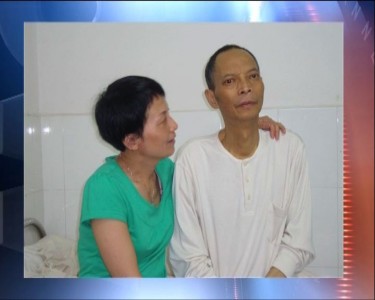Li Wangyang, a Chinese political prisoner who spent most of his life in detention, was found dead on the morning of Wednesday 6 June, 2012, after being interviewed by overseas media about the June 4 (Tiananmen Square) Massacre of 1989 and the life of political prisoners in China.
Li was released in May 5, 2011, after 22 years of imprisonment, deaf and blind because of torture he had received. He was a worker activist and participated in the 1989 student democratic movement as a leading figure for Shaoyang city autonomous worker league.
He was arrested after the Tiananmen crackdown and sent to jail for 11 years under the charge of state subversion. He started a hunger strike in prison and was tortured; the prison guards pulled out his teeth and forced him to eat. He was briefly released in 2000 but sent to prison again in May 2001 for ten years in a crackdown against the China Democracy Party, this time under the charge of incitement to subvert state power.
He was interviewed by Hong Kong cable television for a feature story on the 23rd anniversary of the June 4 Massacre. In his interview, he said he would never regret what he had done for democratic reform in China and he was encouraged by the insistence of Hong Kong people on the vindication of June 4 Massacre.
According to the Chinese Human Rights organization WeiquanWang's report [zh], Li's sister found his body hanging from the window frame of a hospital ward in which he was staying at 7am on June 6, as if he had committed suicide. The police then quickly took away Li's body ignoring the relatives’ request for taking pictures of the dead body. Li's friend refused to believe that Li had committed suicide:
据朱承志先生回忆,6月4日那天,他与李旺阳两人进行了亲密无间的交谈,感觉李旺阳乐观向上,虽然身体健康很差,但出狱后在各界的关注下,身体正在逐渐好转。而就在昨天,李旺阳还要求妹妹为他买一个收音机,以帮助他锻炼听力。
Two photos [WARNING: graphic content] claimed to be taken by eyewitness of the hanging scene have been circulated widely via Facebook and Twitter. They show that the window frame from which Li was hung from was too low and that his feet were still resting on the ground.
Chinese netizens were outraged by the news, below is a selection of tweets reacting to the incident on Twitter [zh]:
@BaiqiaoCh: 欺人太甚!他们连伪装李旺阳自杀都做得如此草率,完全无视天下人的愤怒之情。此生若不找出元凶,我誓不为人!
@tufuwugan: 硬汉李旺阳21年都挺过来了,却非正常死在被十个国保监控下的医院,加上他都耳聋失明行动不便,当然死亡与控制他自由的人有关,旺阳是自由公民,谁限制他谁就是凶手。不让家属和网友接触尸体还抢尸更说明心虚!
@crushglass_X: 李旺阳的生前有多少人关注他?死后被称为某些人成为伟大的民主斗士,这是不是可以说非名人、非大人物的人们坚持的抗争是多么的不被重视。他们抗争所付出的代价,与有名望、有影响的人物相比又是多么的沉重。
@xuange12: 很多事情是这样发生的:你影响了我的政绩,影响了我可能升官的途径,你就是十恶不赦。在我的地盘里,我拥有绝对的权力—我猜测李旺阳是牺牲在这种小人手里。但凡有丁点见识,都犯不着做出这样的事情,全无好处只有弊端。情绪取代理智、无限的权力。
@wenyunchao: 如果李旺阳“被自杀”的疑点最终都未能消除的话,是否可以合理怀疑当局对政治犯及异见人士的暗杀活动已经开始?








7 comments
Lam, try to learn some facts, like prevalence of “partial suspension hanging”:
http://en.wikipedia.org/wiki/Hanging
“by means of partial suspension or partial weight-bearing on the ligature. This method has been most often used in prisons or other institutions, where full suspension support is difficult to devise.”